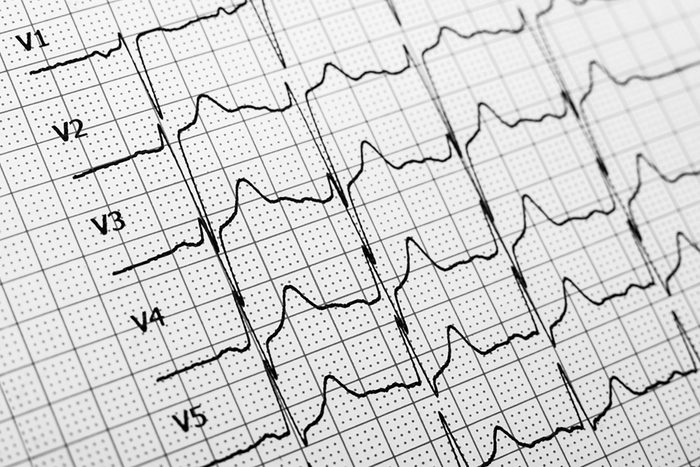
What is epilepsy?
A neurological disorder that impacts more than 3 million people in the United States, epilepsy often attacks with no warning. The disease is characterized by recurrent seizures that are unprovoked. “In patients, a seizure occurs when there is an abnormal burst of electrical activity in the brain that interrupts normal electrical brain function,” explains Emily Klatte, MD, a neurologist and the system medical chief of epilepsy at the OhioHealth Neuroscience Center at Riverside Methodist Hospital in Columbus. “A first seizure may come out of the blue, as will subsequent seizures, which is what can make epilepsy an unpredictable disease—and very scary for patients and families.” In some cases, however, patients may have symptoms that are suggestive of seizures. Keep reading to learn about some possible early seizure symptoms that may be caused by epilepsy.

An aura
While not all epilepsy or seizure sufferers experience an aura, experts agree that it is usually a key symptom. “Though there’s no loss of awareness, an individual suffering from an aura may experience sensory or physical symptoms, emotions or thought changes,” explains Tacjana Friday, MD, a neurologist at the Noran Neurological Clinic in Minneapolis. Nausea is a common predictor that an aura is upon you, though this symptom can be connected to a myriad of other health conditions as well, including early pregnancy. Here’s what it’s really like to have epilepsy, according to someone who has it.

Muscle twitching
This symptom is often a key indicator that someone is experiencing an aura and may potentially fall into a seizure, though there are other reasons for muscle spasms. “Some epilepsy patients experience seizures that begin with a small movement first (partial seizures) that then progresses to whole-body shaking,” explains Isha Gupta, MD, a New York City-based neurologist formerly with IGEA Brain, Spine & Orthopedics. “Additionally, muscle twitching in one extremity or one side of the body can suddenly arise.” This, she points out, can potentially indicate a seizure that is from the part of the brain that controls motor movements. If someone you know is experiencing these seizure symptoms, memorize this infographic that tells you exactly what to do when someone is having a seizure.

Unusual sensations
For some epilepsy sufferers, this symptom could be pins and needles, while for others, it may feel more like electrical-type sensations, says Jaishree Narayanan, MD, a neurologist at NorthShore Medical Group in Evanston, Illinois. She explains that “these can involve one side of the body, repeatedly one part of the body, though the sensations usually do not shift sites.” Fiona Gupta, MD, a neurologist with Mount Sinai Health System in New York City, notes that these feelings can also resemble tingling or even numbness. “These feelings can happen anywhere in the body as well, from head to toe,” she says.

A strange overpowering smell
Another sign of an impending seizure is an overwhelming smell. According to Dr. Fiona Gupta, this can be a noxious smell such as burning rubber or gasoline. “Typically, patients who experience this fragrant sensation will experience the same smell prior to most or all seizures they have,” she explains. In connection with a distorted sense of smell, seizure sufferers may also experience strange tastes, like an unpleasant chemical or metallic taste that is the same every time.

Impending feelings of doom
People who are about to have a seizure often feel an impending fear that can range from mild to extreme. “This is often referred to as having ‘an impending sense of doom,'” Dr. Fiona Gupta explains. This, she points out, may be a symptom of the aura itself, or it may be a signal that a seizure is on the way. When something is wrong, your body often tries to warn you, and not just in the case of a seizure. Check out these other silent signs your body might be in big trouble.

Altered heart or breathing rate
Heavy breathing that feels similar to what you’d experience with a panic attack may also be one of the earliest symptoms of a seizure connected to epilepsy. “Many patients experience feelings of anxiety prior to seizure; they may have a weird feeling and not be able to think right,” Dr. Narayanan explains. “These panic attack–like symptoms may alter one’s sense of perception.” In other words, it may feel as though you’re looking at yourself from the outside. “A sense of dissociation, of things getting smaller or looking distorted or of being in a dream-like state, can be common,” she says.

Lack of bladder control
According to Dr. Isha Gupta, the inability to maintain bladder control may be a predictor of epilepsy. “Oftentimes patients wake up having urinated in their bed, which can potentially indicate that they had a seizure overnight,” she explains. If this person is sleeping alone, however, this symptom may not be detected. Early detection wasn’t possible for a skydiver who had a seizure 12,000 feet above the earth—but here’s how his instructor saved his life.

Tongue biting
Another seizure symptom is biting your tongue while sleeping. “If a patient wakes up and feels pain or possible bleeding from their tongue, this can also be an indication that you had a seizure overnight and bit your tongue,” says Dr. Isha Gupta. If you wake up and notice your tongue is sore and/or bleeding, she recommends mentioning this to your doctor as soon as possible so he or she can conduct further testing.

Vision changes
Although there are many causes for double vision, such as fatigue and medication, Dr. Fiona Gupta explains that patients who have experienced seizures in the past will typically acknowledge these vision changes as a possible warning sign. Such vision changes could be blurriness, circles of light often associated with an aura, or even formed hallucinations.

How common are the seizures?
Epilepsy isn’t always the cause of a seizure, and in fact, only around 1.2 percent of the U.S. population actually has epilepsy, according to the CDC. “Only a doctor can definitively diagnose whether it’s a result of epilepsy or something else,” says Philip Stieg, MD, PhD, chairman and neurosurgeon-in-chief at Weill Cornell Medicine Brain and Spine Center at NewYork-Presbyterian Hospital in New York City. For this reason, all of the experts we interviewed recommend consulting a medical professional at the first sign of any of these seizure symptoms. If epilepsy is not to blame, chances are it’s another health condition that can be treated. Don’t miss these strange symptoms that can signal a serious disease.
